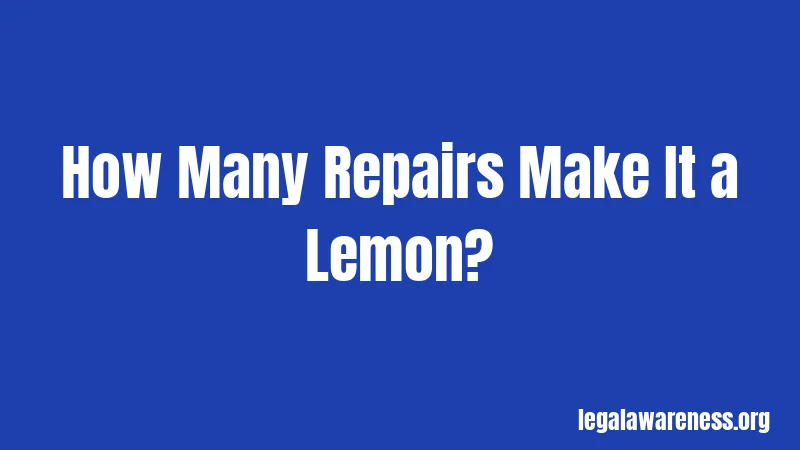Colorado Lemon Laws in 2026: Your Complete Buyer’s Guide
You just bought a new car. You’re excited. Then something goes wrong. The engine makes weird noises. The transmission stutters. The check engine light won’t turn off. Now you’re stuck with a defective vehicle and a stack of repair bills. Welcome to what many car buyers call owning a “lemon.”
Here’s the good news: Colorado has your back. The state’s lemon laws protect you if you end up with a defective vehicle. Even better? Colorado just made these protections way stronger in 2024. Let’s break down exactly what you need to know.
What Is a Lemon, Anyway?

A lemon is basically a new car with serious manufacturing problems that the dealer can’t fix. Think of it like this: the manufacturer made a promise that the car would work properly. If it doesn’t, and fixing it doesn’t help, that’s when lemon law kicks in.
These problems have to be real ones. We’re talking about defects that affect how safely you can drive the vehicle. We’re also talking about problems that tank the car’s resale value or make it impossible to use normally. A tiny scratch? Not a lemon. An engine that won’t start? That’s definitely a lemon.
Stay with me here. The key word is “nonconformity.” That just means the car doesn’t match what the manufacturer promised it would do when it was new.
Colorado’s Big Lemon Law Changes (2024)
Colorado made major updates to its lemon law in 2024. Attorney General Phil Weiser said it straight: “Colorado’s lemon law, which used to be one of the worst in the country, just got a lot better for consumers.”
These changes took effect on August 7, 2024. If you bought a car before that date, the old rules still apply to you. If you bought one after August 7, 2024, the new stronger rules protect you.
What Changed? Here’s the Basics
Before 2024, Colorado’s lemon law was pretty weak. Car buyers didn’t get much protection. Now it’s significantly stronger. The state made five major changes, and they all favor you.
First, more types of vehicles are covered now. Previously, only brand-new personal cars were protected. Now motor vehicles used by small businesses for both business and personal purposes are now included. Own a truck for your side hustle? Protection applies. Drive a van for your small business and personal errands? You’re covered too.
Second, the protection period got longer. Before, you only had one year of coverage after buying the car. Now you get up to two years of purchase or the first 24,000 miles of the vehicle’s operation, whichever comes first. This makes a huge difference. You don’t have to rush to prove your car is a lemon.
Third, it’s way easier to qualify as a “lemon” now. The bar got lower. Wondering what counts as “reasonable” repair attempts? Here’s the deal.
How Many Repairs Make It a Lemon?

This is where things get really important. Okay, pause. Read this carefully. The number of repair attempts matters a lot.
Under the old law, you needed four failed repair attempts before the car qualified as a lemon. That meant driving an unreliable car for months while the dealer tried over and over to fix it.
The law lowers the lemon classification requirement from four to three failed repair attempts of the same defect or after 24 or more business days of repairs that keep it off the road.
So now you need one of these things to happen:
Your car goes to the shop three times for the same problem and they don’t fix it. Or your car spends 24 or more business days in the shop getting repaired. Time spent away from you, broken and waiting to be fixed—that counts.
Here’s where it gets better for safety issues. If the defect creates a significant safety problem, where a defect significantly impacts the safety of a vehicle, it will be presumed a lemon after two failed repair attempts of the defect. Just two times. That’s huge if your brakes are failing or your airbags won’t deploy. You don’t have to drive an unsafe car waiting for the third attempt.
What Counts as “Business Days”?
Not sure what counts toward those 24 days? Here’s the thing—they’re business days, not calendar days. So weekends don’t count. Holidays don’t count. Only the days the shop is actually open and your car is sitting there waiting for repairs.
Plus, here’s what really helps you: any time that the vehicle is under repair and unusable does not count toward this limit. The manufacturer can’t try to trick you by saying “well, it’s only been 10 days of actual repairs.” Colorado’s law is smart about this.
Most people don’t realize how strict these laws are. But they work in your favor.
When Do You Need to Report the Problem?

Timing matters. You can’t wait three years and then claim the car is a lemon. Colorado gives you a specific window.
You need to notify the dealer about the problem within the earlier of the motor vehicle’s first 24,000 miles or 2 years after original delivery of the motor vehicle. So if you buy a car on January 1, 2024, you have until January 1, 2026 or 24,000 miles—whichever happens first—to report the defect.
Here’s the important part: you’re not locked into whatever timeline the dealer suggests. The law is on your side. Tell the dealer in writing that the car doesn’t meet its warranty. Keep a copy for yourself.
How Long Can You Actually File a Claim?
This is another area where Colorado got way better. The law now gives you 30 months after the delivery date to file a lemon law claim. That’s 2.5 years.
And here’s the kicker: if your car is in the shop being repaired, that time doesn’t count against you. So if you reported the problem in month 2, then the car was in the shop for six months, you haven’t burned up six months of your filing window. Only the actual months you were driving (or couldn’t drive) an unusable car count.
This gives you real breathing room to try repairs, see if they work, and then make a claim if nothing sticks.
What Happens If Your Car Is Actually a Lemon?
Let’s say you’ve met the requirements. Three failed repair attempts. Or 24 days in the shop. Or two failed attempts on a safety defect. Now what?
The manufacturer has to do one of two things: replace the vehicle or refund your money.
A replacement means they give you a new car of the same or similar make, model, and features. It has to be brand new, not used. This is actually a pretty solid option because you get a fresh start.
A refund means they give you back the money you paid. But hold on—they can deduct something for how much you drove it. This is where the old law was messy. Colorado fixed it.
How Much Can They Deduct?
The manufacturer can deduct money for the time you actually used the car. The old law didn’t explain how much they could deduct. Colorado now provides a specific formula, which means the process is fairer and more predictable.
The deduction is called a “use allowance.” Think of it like this: you got to drive the car for a while, so they get to reduce your refund a little bit. But it’s calculated in a fair way that the law spells out. They can’t just make up a random number.
You won’t get $100% back, but you’ll get way more than if they tried to charge you as if you drove it for years.
What About Used “Lemon Buyback” Vehicles?
Here’s something important if you’re shopping used cars. When a manufacturer buys back a lemon and fixes it, dealers sometimes sell it again as a regular used car. Before 2024, there was no way to know you were buying a previously defective vehicle.
Now there is. The updated law includes disclosure protections for purchasers of used “lemon buyback” motor vehicles, requiring that a decal be affixed to such vehicles indicating “Lemon Law Buyback”. The title also has to show it was a lemon buyback.
This doesn’t mean you can’t buy one. It just means you know what you’re getting. You can negotiate a better price knowing the car had serious problems before.
Your Rights When Buying a New Car
Before you even get into problems, know your rights when making the purchase. Dealers have to give you information about your lemon law protections. They also have to let you inspect the car or give you a 7-day free-look period, during which the purchaser may return the motor vehicle and receive a refund of all money paid to purchase the motor vehicle.
Think of it like a trial period. Seven days to make sure the car is what you want. If you find problems in that window, you can return it no questions asked.
What If Your Car Doesn’t Quite Qualify?
Not every defective car qualifies as a lemon. Sometimes the problem doesn’t affect safety or the car’s value. Or maybe it only needed repairs twice. What happens then?
You’re not completely out of luck. Colorado has other consumer protection laws. The Truth In Lending Act covers certain situations. The Magnuson-Moss Warranty Act is a federal law that sometimes helps when state lemon laws don’t.
This is honestly where having a lawyer matters. They know all the angles. The good news? Many lemon law attorneys work on contingency. That means they don’t get paid unless you win money.
What Can You Actually Recover?
Okay, this is the important part. If you win a lemon law case, what’s the payday?
You get the refund or replacement. You also can recover any incidental expenses you paid while dealing with the defect. That might include rental car fees while your car was in the shop, towing costs, or repair costs you paid out of pocket.
You can also recover attorney fees. This is huge. It means if you hire a lawyer, the manufacturer pays them, not you. You also get court costs.
Colorado law is smart here. It makes it worthwhile to fight, even for cars that aren’t super expensive.
How to Document Everything
Here’s practical advice: keep records of everything. Write down every repair attempt. Save every receipt. Document every time the car was in the shop.
Take photos of problems if you can. Write emails to the dealer explaining issues. Keep copies of warranty information. Take screenshots of any digital records.
When you decide to file a claim, having all this documentation makes your case much stronger. Dealers and manufacturers take it seriously when you show up with three years of organized records.
How to File a Complaint
If you believe you have a lemon, contact the Colorado Attorney General’s office. You can file a complaint at StopFraudColorado.gov. This is free and it starts an official record.
Document everything in that complaint. Dates, repair attempts, problems—all of it. This helps the state track patterns. If a particular dealership or manufacturer has a lot of lemon complaints, officials will notice.
You should also consider hiring a lemon law attorney. Many offer free consultations. They’ll review your situation and tell you if you have a case.
What About Manufacturer Arbitration?
Some manufacturers have arbitration agreements in your warranty paperwork. This means they want you to go through their process instead of court.
Here’s the thing: you’re not required to go through manufacturer arbitration in Colorado. You have the right to take them to court. Some people choose arbitration because it’s faster. Others prefer court because they think judges will be tougher on manufacturers.
An attorney can help you decide which path makes sense for your situation.
Recent Updates and What’s Coming
The August 2024 law (Senate Bill 24-192) was the biggest change in years. It fixed what Colorado Attorney General Phil Weiser called “one of the weaker lemon laws in the nation.”
The state is still looking at whether to extend protections to used cars. Right now, lemon laws only cover new vehicles. Used cars are “as is” sales unless they’re under warranty. Weiser said his office is exploring whether more protections make sense for used car buyers too.
For now, know that you’re much better protected if you buy a new car in Colorado.
Common Mistakes Buyers Make
You’re not alone if you don’t understand all this. Most people get lemon laws wrong.
Many people assume one repair attempt means they can return the car. They can’t. You need three attempts or 24 days in the shop.
Other people wait too long to report problems. They think if they wait six months, problems will become “obvious” lemons. They won’t. You need to notify the dealer within two years or 24,000 miles.
Some folks never document anything. Then when they try to file a claim, they have no proof of repair attempts. This makes it way harder to win.
Don’t be one of these people. Report problems early. Keep records. Know your timeline.
Why This Matters Right Now
You might be wondering why lemon law matters in 2026. Vehicle manufacturing defects happen. They’re rare, but they happen to real people.
When they happen to you, the difference between a weak law and a strong law can mean thousands of dollars. Colorado’s updated law means you might actually get your money back instead of being stuck with a broken car.
Your Next Steps
If you’re buying a new car soon, learn about lemon law before you sign anything. Ask the dealer to explain your rights. Read that warranty paperwork even though it’s boring.
If you already have a car with problems, start documenting now. Write down everything. Keep all records.
If you think your car is a lemon, call a lemon law attorney. Most consultations are free. They’ll tell you straight if you have a case.
Now you know the basics. Stay informed, stay safe, and when in doubt, look it up or ask a lawyer. Colorado’s got your back now more than ever.
Frequently Asked Questions
What counts as a “safety defect” under Colorado lemon law? A safety defect is any problem that makes the car unsafe to drive. Failing brakes, defective airbags, steering problems, or engine issues that cause stalling all count. If the problem could injure you or your passengers, it’s likely a safety defect.
How much does it cost to hire a lemon law attorney? Most lemon law attorneys work on contingency, meaning you don’t pay unless you win. If you win, the manufacturer pays your attorney fees as part of the settlement.
Can I buy a lemon as a used car and still claim lemon law protection? No. Lemon law only applies to new vehicles. Once a car is sold used, it’s typically sold “as is” unless it’s still under manufacturer warranty. However, if it’s a known lemon buyback, it must be labeled as such.
What if the dealer refuses to repair my car? Document everything and file a complaint with the Colorado Attorney General’s office at StopFraudColorado.gov. You can also contact a lemon law attorney about your options.
How long does a lemon law case usually take? It depends on whether you go through arbitration or court. Arbitration might take a few months. Court cases can take longer, sometimes over a year. Your attorney can give you a better estimate based on your specific situation.
References
- Colorado Attorney General’s Public Advisory on Lemon Law (August 2024)
- Colorado Senate Bill 24-192 – Motor Vehicle Lemon Law
- Colorado Lemon Law Statute (C.R.S.A. 42-10-101 to 42-10-107)
- Colorado Attorney General Consumer Complaints – StopFraudColorado.gov
- Colorado Department of Revenue – Auto Industry and Consumers
